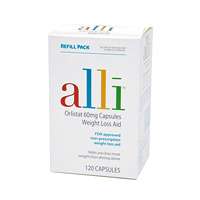
The Alli weight loss aid has been on the market for about 10 years, but only for three or four years in non-prescription strength.
The prescription formula of Alli weight loss is called Orlistat, and has been prescribed by doctors as a weight loss supplement on a regular basis since it was released on the market.
What is Alli?
Alli weight loss is the non-prescription version of Orlistat, and is the first over the counter weight loss supplement to be approved by the FDA. It is taken with meals, or up to one hour after a meal.
How Does The Alli Supplement Work?
Alli is what is known as a “lipase inhibitor”. When taken with a meal, it blocks some of the fat from that meal from being absorbed into the intestines. The fat is not processed, so the calories are not introduced into the body. Instead the fat is excreted from the body in the stools.
Dieters using Alli weight loss take the capsule with any meal they eat that has fat. Because fat is some of the most calorie dense food we eat, and because Alli prevents this fat from being absorbed, the dieter is automatically consuming fewer calories in a day when taking Alli with a meal. This is how the supplement helps dieters lose weight.
The Negatives of Using Alli
Before Alli became available over the counter, physicians used it to help people lose weight who were suffering from weight related illnesses like high blood pressure and high cholesterol.
Today, of course, Alli is available to everyone. It can certainly help you lose weight, but there are some things to consider.
1) Alli Does Not Help You Modify Your Eating Habits
Though it is recommended that Alli be used along with a low fat diet, the supplement itself is a bit of a “quick fix” in that it allows dieters to lose weight without changing the way they eat. If eating habits are not changed, dieters are likely to gain back the weight lost once they stop taking Alli.
2) There May Be Some Side Effects
Many dieters have reported diarrhea and upset stomach with Alli, because of the way that it moves the fat through your system. Some people have reported such severe gastrointestinal issues with the supplement that they have had to stop using the product.
These side effects are much more severe in people who eat a diet high in fat. Doctors recommend that your diet have no more than 30% fat when taking Alli.
3) You May Need Additional Supplements
Because Alli blocks your body’s absorption of fat, it also blocks the absorption of some fat soluble vitamins and beta carotene.
It is important to supplement with a multi-vitamin while using Alli. The multi-vitamin must be taken either 2 hours before a dose of Alli, or two hours after to ensure absorption of the vitamins.
Will I Lose Weight Using Alli?
Many people have reported weight loss success with Alli. It is not for everyone, and should not be used as a quick fix. However, when used in conjunction with a sensible diet, Alli can help you lose more weight than you might on your own.




Be the first to comment